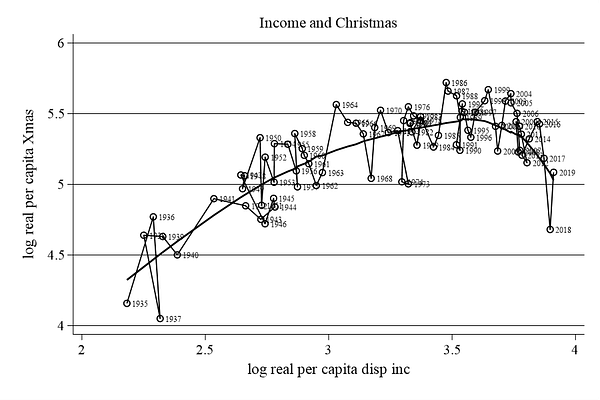Best of #econtwitter - Week of December 18, 2022: interesting tweets
Welcome readers old and new to this week’s edition of Best of Econtwitter. Please submit suggestions — very much including your own work! — over email or on Twitter @just_economics.
A slightly different format this week (also, gmail may cut off the email, and you would need to open in the browser to see all tweets). Feedback, as always, is welcome.
Interesting discussions

Epistemological Econ Question: We have many frictionless benchmarks. I.e., Modigliani-Miller, Ricardian Equivalence, Real-Business Cycle, Arrow-Debreu, Wallace, Backus-Kehoe-Kydland, Atkison-Stiglitz, etc. How do you explain the value developing such benchmarks to students?

@SakiBigio When deriving those benchmark results, you discover the precise (often narrow) assumptions needed for them to hold — making you more aware of the limitations and setting the stage for subsequent work. Once aware of needed assumptions, you know where you can work to relax them
^other good answers too

"[Raising aspirations] is in fact one of the most valuable things you can do with your time and with your life." Tyler Cowen.


The most underrated way to learn economics? YouTube 🎥
No. I don't mean for undergrads. I mean for academics and econ policy nerds!
Here are the best econ channels to learn from:
^more; conferences/seminars version

Important tips from #EconMeToo: (1) save text messages/emails that could be evidence of bad behavior; (2) tell a friend if/when something happens, even if you're not sure you'll ever want to tell anyone else; (3) save a report in @callisto once it expands to all .edu emails.

Revision rooky mistake story time:
I was lucky to get three positive reviewers who gave very constructive comments. One of the comments highlighted that it is confusing to use two samples of the data in different sections. I agreed, and then...

The Review of Economic Studies @RevEconStudies

Since 2000, as income has continued to rise, per capita holiday gift spending has actually fallen. While holiday gift spending remains normal in post-2000 cross-household comparisons, it appears inferior in the national time series. US holiday gift giving is in retreat.

Public goods

Economics of innovation section!
The slides for the recently concluded 6-week online economics of ideas, science and innovation PhD short course are up here (scroll to schedule section):

ChatGPT

As I was grading my final exam for my upper-level undergraduate Economics of Education course, I decided to check how ChatGPT would do on the exam.
Answer: ChatGPT scored a 77%, which was just slightly below the class average.

ChatGPT is bad at economics. A few examples:
1⃣ It does not understand Ricardo's 1817's comparative advantage theory. Its view is stuck on Smith's 1776 absolute advantage theory.

Fin

"You are an economist? Maybe you can give me some hints about making money."
"Oh no, I am very bad at everything that has to do with money--and that's okay for the kind of economics I do."
"What kind of economics do you do?"
"Monetary economics".

Anton Hilado @anton_hilado







